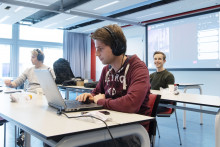‘We all know how it is to work from home,’ Jan de Leede, assistant professor of Human Resource Management, began his talk. ‘We all struggle to combine work and home situation. That is a new challenge, but at the same time it is not so new – these new ways of working already existed before. Until 2019, 36% of workers in the Netherlands regularly worked from home. The difference is that homeworking is enforced now due to the corona crisis.’
Pros and cons
In his presentation, De Leede shared results of studies of working under Covid-19, including preliminary findings from the recent UT survey which he helped to create. ‘We see the results are mixed. People report both advantages and disadvantages to working at home.’
This is also true for the UT survey findings, which should be finalized next week. ‘The top three positive effects among UT employees seem to be less travel time, taking a break when it suits them and ability to concentrate. The top three negative effects are not seeing colleagues, being tied to the computer and not getting enough exercise.’ These findings are consistent with others conducted throughout Europe.
'There is an optimum amount of hours that you can work from home'
‘Positive effects are actually quite strong, but as we can see: only online work might be too much of a good thing,’ continued De Leede. ‘There is an optimum amount of hours that you can work from home. Before corona this number was eight hours a week. But the UT survey shows that for UT employees it is two days a week now.’
Social cohesion
According to De Leede, the main issue that companies and employees seem to struggle with is social cohesion. ‘We should pay attention to creating social cohesion to prevent professional isolation. That is one the main lessons we already knew from the past and it is even more important now, in this enforced situation. People miss each other and the environment, they miss talking about work and their lives. We should try to compensate this in online coffee breaks – on regular basis, so you stay connected.’
On top of ‘keeping in contact’, the scientist offered a few more suggestions on how to cope with the negative effects of working at home. ‘Share good practices with each other. Not every supervisor might be able to find good solutions naturally. You can learn from each other. And adapt your measures to personal situation. There isn’t a single group that has the main problems. Some people need more attention than others. The key is for supervisors to individualize the measures.’







